BLO1105 Business Law Assignment: Contract Law and Consumer Rights
VerifiedAdded on 2023/06/04
|10
|3166
|454
Case Study
AI Summary
This case study analyzes a contract dispute between Vincenzo Franco and Scenic Views, focusing on issues of misrepresentation, undue influence, and unconscionable conduct in contract formation. It examines the validity of the contract and the remedies available to Vincenzo Franco under Australian law, including the potential for rescission and damages. The analysis also delves into the Australian Consumer Law (ACL) guarantees that Vincenzo can invoke, particularly concerning misleading or deceptive conduct and false representations. The study considers whether pre-contractual statements were mere representations or binding terms, and explores the concept of collateral contracts. Ultimately, the case study provides a comprehensive assessment of the legal principles applicable to the scenario and determines the likely outcome of a legal challenge.
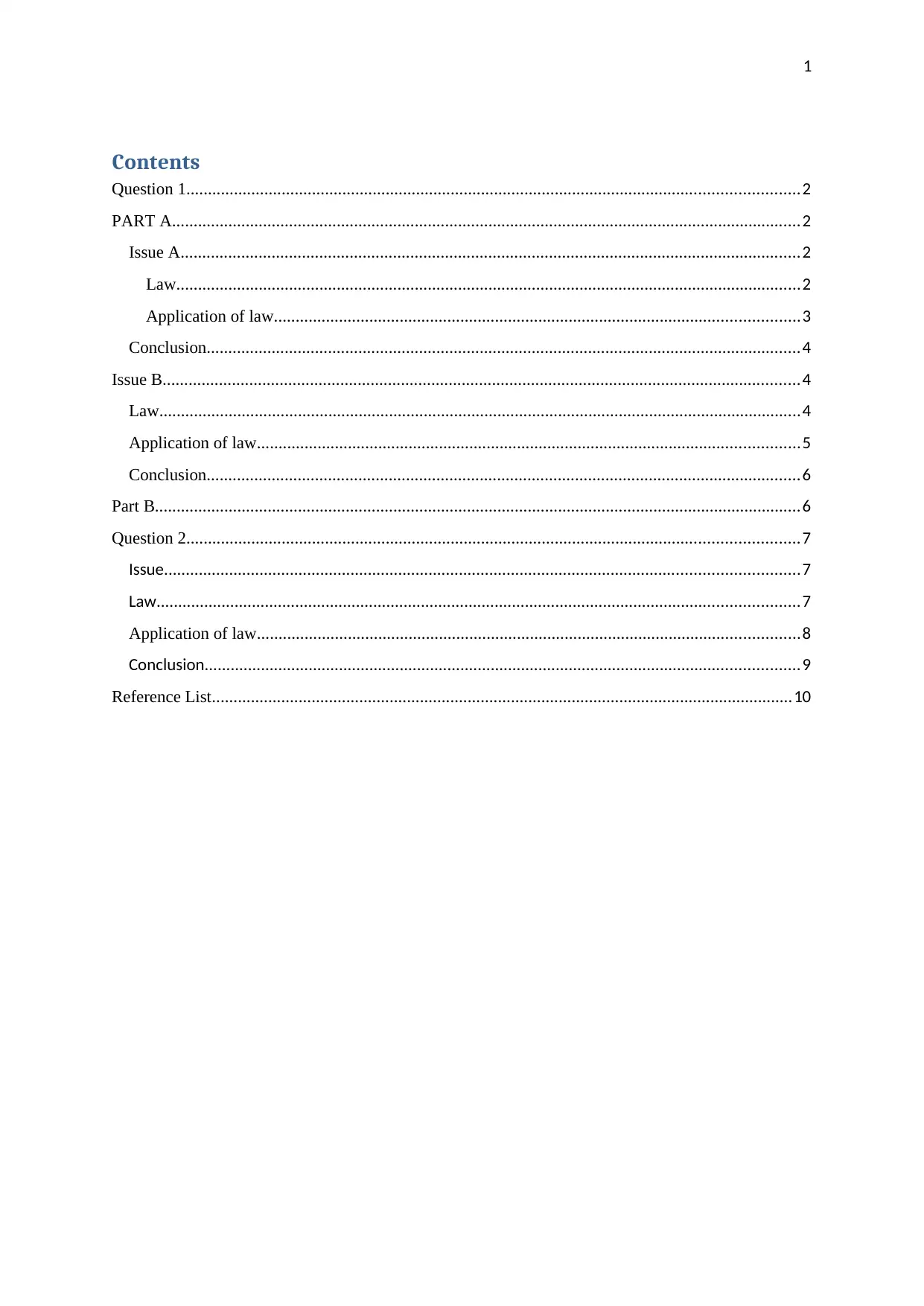
1
Contents
Question 1.............................................................................................................................................2
PART A.................................................................................................................................................2
Issue A...............................................................................................................................................2
Law................................................................................................................................................2
Application of law.........................................................................................................................3
Conclusion.........................................................................................................................................4
Issue B...................................................................................................................................................4
Law....................................................................................................................................................4
Application of law.............................................................................................................................5
Conclusion.........................................................................................................................................6
Part B.....................................................................................................................................................6
Question 2.............................................................................................................................................7
Issue..................................................................................................................................................7
Law....................................................................................................................................................7
Application of law.............................................................................................................................8
Conclusion.........................................................................................................................................9
Reference List......................................................................................................................................10
Contents
Question 1.............................................................................................................................................2
PART A.................................................................................................................................................2
Issue A...............................................................................................................................................2
Law................................................................................................................................................2
Application of law.........................................................................................................................3
Conclusion.........................................................................................................................................4
Issue B...................................................................................................................................................4
Law....................................................................................................................................................4
Application of law.............................................................................................................................5
Conclusion.........................................................................................................................................6
Part B.....................................................................................................................................................6
Question 2.............................................................................................................................................7
Issue..................................................................................................................................................7
Law....................................................................................................................................................7
Application of law.............................................................................................................................8
Conclusion.........................................................................................................................................9
Reference List......................................................................................................................................10
Paraphrase This Document
Need a fresh take? Get an instant paraphrase of this document with our AI Paraphraser
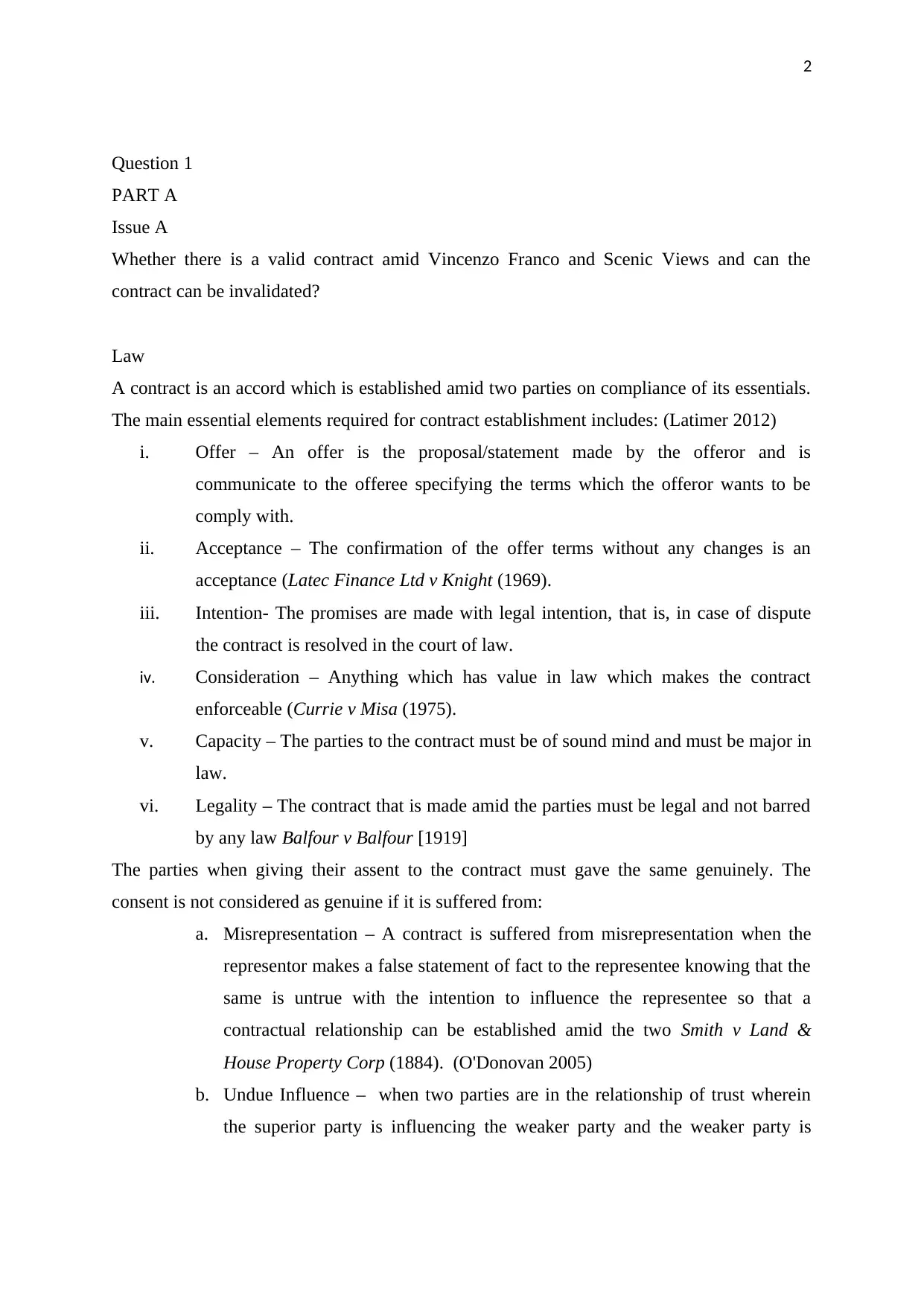
2
Question 1
PART A
Issue A
Whether there is a valid contract amid Vincenzo Franco and Scenic Views and can the
contract can be invalidated?
Law
A contract is an accord which is established amid two parties on compliance of its essentials.
The main essential elements required for contract establishment includes: (Latimer 2012)
i. Offer – An offer is the proposal/statement made by the offeror and is
communicate to the offeree specifying the terms which the offeror wants to be
comply with.
ii. Acceptance – The confirmation of the offer terms without any changes is an
acceptance (Latec Finance Ltd v Knight (1969).
iii. Intention- The promises are made with legal intention, that is, in case of dispute
the contract is resolved in the court of law.
iv. Consideration – Anything which has value in law which makes the contract
enforceable (Currie v Misa (1975).
v. Capacity – The parties to the contract must be of sound mind and must be major in
law.
vi. Legality – The contract that is made amid the parties must be legal and not barred
by any law Balfour v Balfour [1919]
The parties when giving their assent to the contract must gave the same genuinely. The
consent is not considered as genuine if it is suffered from:
a. Misrepresentation – A contract is suffered from misrepresentation when the
representor makes a false statement of fact to the representee knowing that the
same is untrue with the intention to influence the representee so that a
contractual relationship can be established amid the two Smith v Land &
House Property Corp (1884). (O'Donovan 2005)
b. Undue Influence – when two parties are in the relationship of trust wherein
the superior party is influencing the weaker party and the weaker party is
Question 1
PART A
Issue A
Whether there is a valid contract amid Vincenzo Franco and Scenic Views and can the
contract can be invalidated?
Law
A contract is an accord which is established amid two parties on compliance of its essentials.
The main essential elements required for contract establishment includes: (Latimer 2012)
i. Offer – An offer is the proposal/statement made by the offeror and is
communicate to the offeree specifying the terms which the offeror wants to be
comply with.
ii. Acceptance – The confirmation of the offer terms without any changes is an
acceptance (Latec Finance Ltd v Knight (1969).
iii. Intention- The promises are made with legal intention, that is, in case of dispute
the contract is resolved in the court of law.
iv. Consideration – Anything which has value in law which makes the contract
enforceable (Currie v Misa (1975).
v. Capacity – The parties to the contract must be of sound mind and must be major in
law.
vi. Legality – The contract that is made amid the parties must be legal and not barred
by any law Balfour v Balfour [1919]
The parties when giving their assent to the contract must gave the same genuinely. The
consent is not considered as genuine if it is suffered from:
a. Misrepresentation – A contract is suffered from misrepresentation when the
representor makes a false statement of fact to the representee knowing that the
same is untrue with the intention to influence the representee so that a
contractual relationship can be established amid the two Smith v Land &
House Property Corp (1884). (O'Donovan 2005)
b. Undue Influence – when two parties are in the relationship of trust wherein
the superior party is influencing the weaker party and the weaker party is
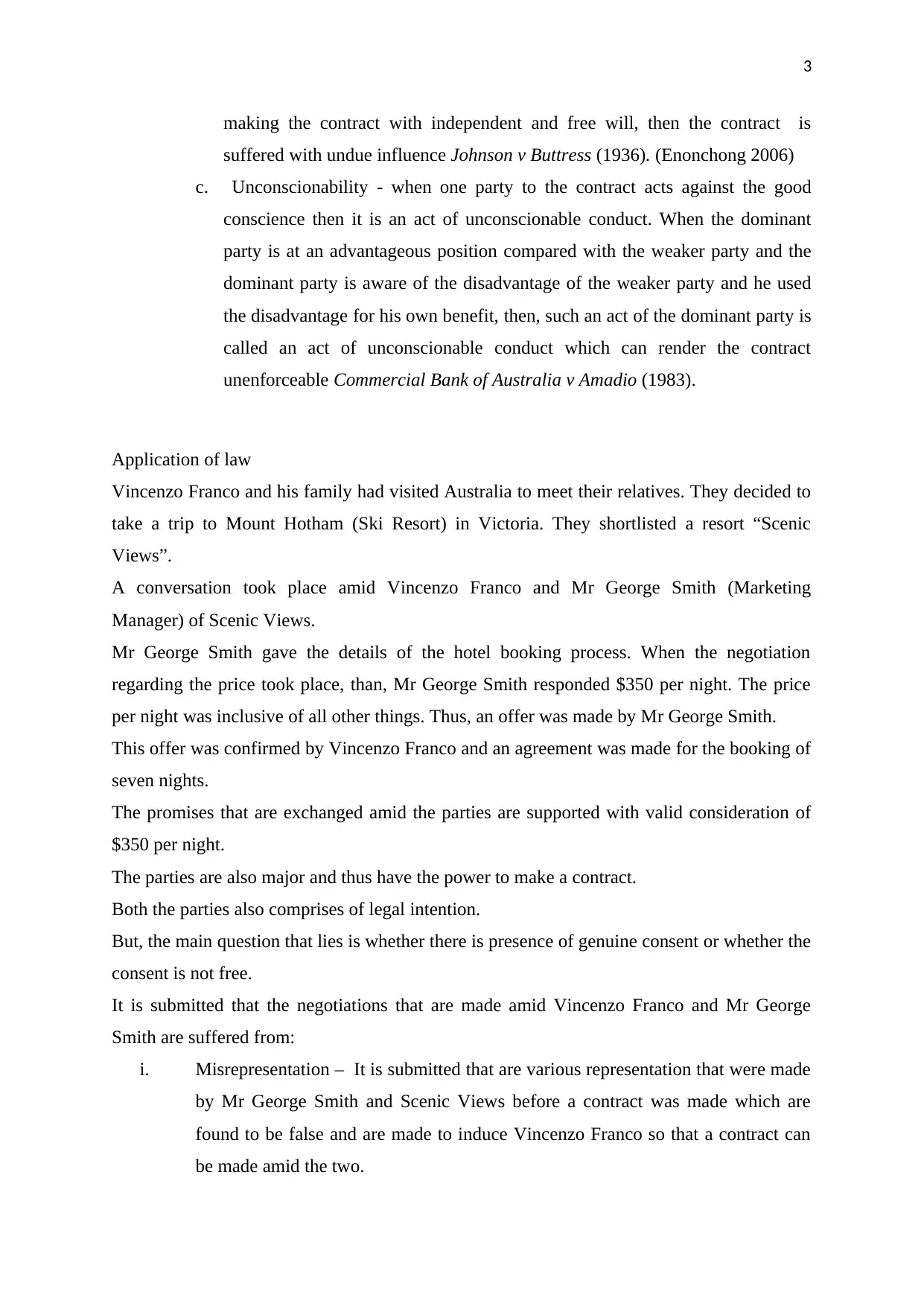
3
making the contract with independent and free will, then the contract is
suffered with undue influence Johnson v Buttress (1936). (Enonchong 2006)
c. Unconscionability - when one party to the contract acts against the good
conscience then it is an act of unconscionable conduct. When the dominant
party is at an advantageous position compared with the weaker party and the
dominant party is aware of the disadvantage of the weaker party and he used
the disadvantage for his own benefit, then, such an act of the dominant party is
called an act of unconscionable conduct which can render the contract
unenforceable Commercial Bank of Australia v Amadio (1983).
Application of law
Vincenzo Franco and his family had visited Australia to meet their relatives. They decided to
take a trip to Mount Hotham (Ski Resort) in Victoria. They shortlisted a resort “Scenic
Views”.
A conversation took place amid Vincenzo Franco and Mr George Smith (Marketing
Manager) of Scenic Views.
Mr George Smith gave the details of the hotel booking process. When the negotiation
regarding the price took place, than, Mr George Smith responded $350 per night. The price
per night was inclusive of all other things. Thus, an offer was made by Mr George Smith.
This offer was confirmed by Vincenzo Franco and an agreement was made for the booking of
seven nights.
The promises that are exchanged amid the parties are supported with valid consideration of
$350 per night.
The parties are also major and thus have the power to make a contract.
Both the parties also comprises of legal intention.
But, the main question that lies is whether there is presence of genuine consent or whether the
consent is not free.
It is submitted that the negotiations that are made amid Vincenzo Franco and Mr George
Smith are suffered from:
i. Misrepresentation – It is submitted that are various representation that were made
by Mr George Smith and Scenic Views before a contract was made which are
found to be false and are made to induce Vincenzo Franco so that a contract can
be made amid the two.
making the contract with independent and free will, then the contract is
suffered with undue influence Johnson v Buttress (1936). (Enonchong 2006)
c. Unconscionability - when one party to the contract acts against the good
conscience then it is an act of unconscionable conduct. When the dominant
party is at an advantageous position compared with the weaker party and the
dominant party is aware of the disadvantage of the weaker party and he used
the disadvantage for his own benefit, then, such an act of the dominant party is
called an act of unconscionable conduct which can render the contract
unenforceable Commercial Bank of Australia v Amadio (1983).
Application of law
Vincenzo Franco and his family had visited Australia to meet their relatives. They decided to
take a trip to Mount Hotham (Ski Resort) in Victoria. They shortlisted a resort “Scenic
Views”.
A conversation took place amid Vincenzo Franco and Mr George Smith (Marketing
Manager) of Scenic Views.
Mr George Smith gave the details of the hotel booking process. When the negotiation
regarding the price took place, than, Mr George Smith responded $350 per night. The price
per night was inclusive of all other things. Thus, an offer was made by Mr George Smith.
This offer was confirmed by Vincenzo Franco and an agreement was made for the booking of
seven nights.
The promises that are exchanged amid the parties are supported with valid consideration of
$350 per night.
The parties are also major and thus have the power to make a contract.
Both the parties also comprises of legal intention.
But, the main question that lies is whether there is presence of genuine consent or whether the
consent is not free.
It is submitted that the negotiations that are made amid Vincenzo Franco and Mr George
Smith are suffered from:
i. Misrepresentation – It is submitted that are various representation that were made
by Mr George Smith and Scenic Views before a contract was made which are
found to be false and are made to induce Vincenzo Franco so that a contract can
be made amid the two.
⊘ This is a preview!⊘
Do you want full access?
Subscribe today to unlock all pages.

Trusted by 1+ million students worldwide
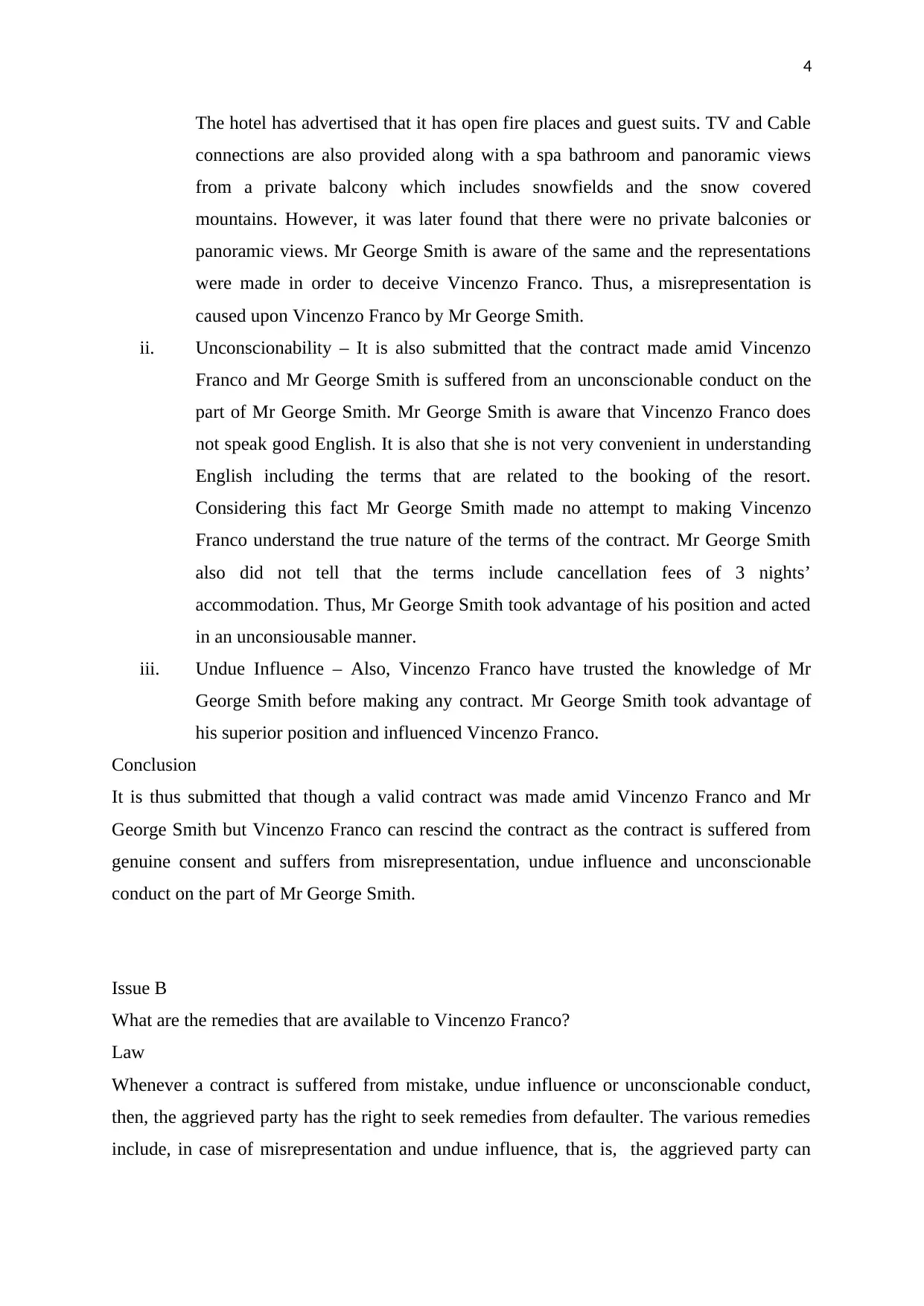
4
The hotel has advertised that it has open fire places and guest suits. TV and Cable
connections are also provided along with a spa bathroom and panoramic views
from a private balcony which includes snowfields and the snow covered
mountains. However, it was later found that there were no private balconies or
panoramic views. Mr George Smith is aware of the same and the representations
were made in order to deceive Vincenzo Franco. Thus, a misrepresentation is
caused upon Vincenzo Franco by Mr George Smith.
ii. Unconscionability – It is also submitted that the contract made amid Vincenzo
Franco and Mr George Smith is suffered from an unconscionable conduct on the
part of Mr George Smith. Mr George Smith is aware that Vincenzo Franco does
not speak good English. It is also that she is not very convenient in understanding
English including the terms that are related to the booking of the resort.
Considering this fact Mr George Smith made no attempt to making Vincenzo
Franco understand the true nature of the terms of the contract. Mr George Smith
also did not tell that the terms include cancellation fees of 3 nights’
accommodation. Thus, Mr George Smith took advantage of his position and acted
in an unconsiousable manner.
iii. Undue Influence – Also, Vincenzo Franco have trusted the knowledge of Mr
George Smith before making any contract. Mr George Smith took advantage of
his superior position and influenced Vincenzo Franco.
Conclusion
It is thus submitted that though a valid contract was made amid Vincenzo Franco and Mr
George Smith but Vincenzo Franco can rescind the contract as the contract is suffered from
genuine consent and suffers from misrepresentation, undue influence and unconscionable
conduct on the part of Mr George Smith.
Issue B
What are the remedies that are available to Vincenzo Franco?
Law
Whenever a contract is suffered from mistake, undue influence or unconscionable conduct,
then, the aggrieved party has the right to seek remedies from defaulter. The various remedies
include, in case of misrepresentation and undue influence, that is, the aggrieved party can
The hotel has advertised that it has open fire places and guest suits. TV and Cable
connections are also provided along with a spa bathroom and panoramic views
from a private balcony which includes snowfields and the snow covered
mountains. However, it was later found that there were no private balconies or
panoramic views. Mr George Smith is aware of the same and the representations
were made in order to deceive Vincenzo Franco. Thus, a misrepresentation is
caused upon Vincenzo Franco by Mr George Smith.
ii. Unconscionability – It is also submitted that the contract made amid Vincenzo
Franco and Mr George Smith is suffered from an unconscionable conduct on the
part of Mr George Smith. Mr George Smith is aware that Vincenzo Franco does
not speak good English. It is also that she is not very convenient in understanding
English including the terms that are related to the booking of the resort.
Considering this fact Mr George Smith made no attempt to making Vincenzo
Franco understand the true nature of the terms of the contract. Mr George Smith
also did not tell that the terms include cancellation fees of 3 nights’
accommodation. Thus, Mr George Smith took advantage of his position and acted
in an unconsiousable manner.
iii. Undue Influence – Also, Vincenzo Franco have trusted the knowledge of Mr
George Smith before making any contract. Mr George Smith took advantage of
his superior position and influenced Vincenzo Franco.
Conclusion
It is thus submitted that though a valid contract was made amid Vincenzo Franco and Mr
George Smith but Vincenzo Franco can rescind the contract as the contract is suffered from
genuine consent and suffers from misrepresentation, undue influence and unconscionable
conduct on the part of Mr George Smith.
Issue B
What are the remedies that are available to Vincenzo Franco?
Law
Whenever a contract is suffered from mistake, undue influence or unconscionable conduct,
then, the aggrieved party has the right to seek remedies from defaulter. The various remedies
include, in case of misrepresentation and undue influence, that is, the aggrieved party can
Paraphrase This Document
Need a fresh take? Get an instant paraphrase of this document with our AI Paraphraser
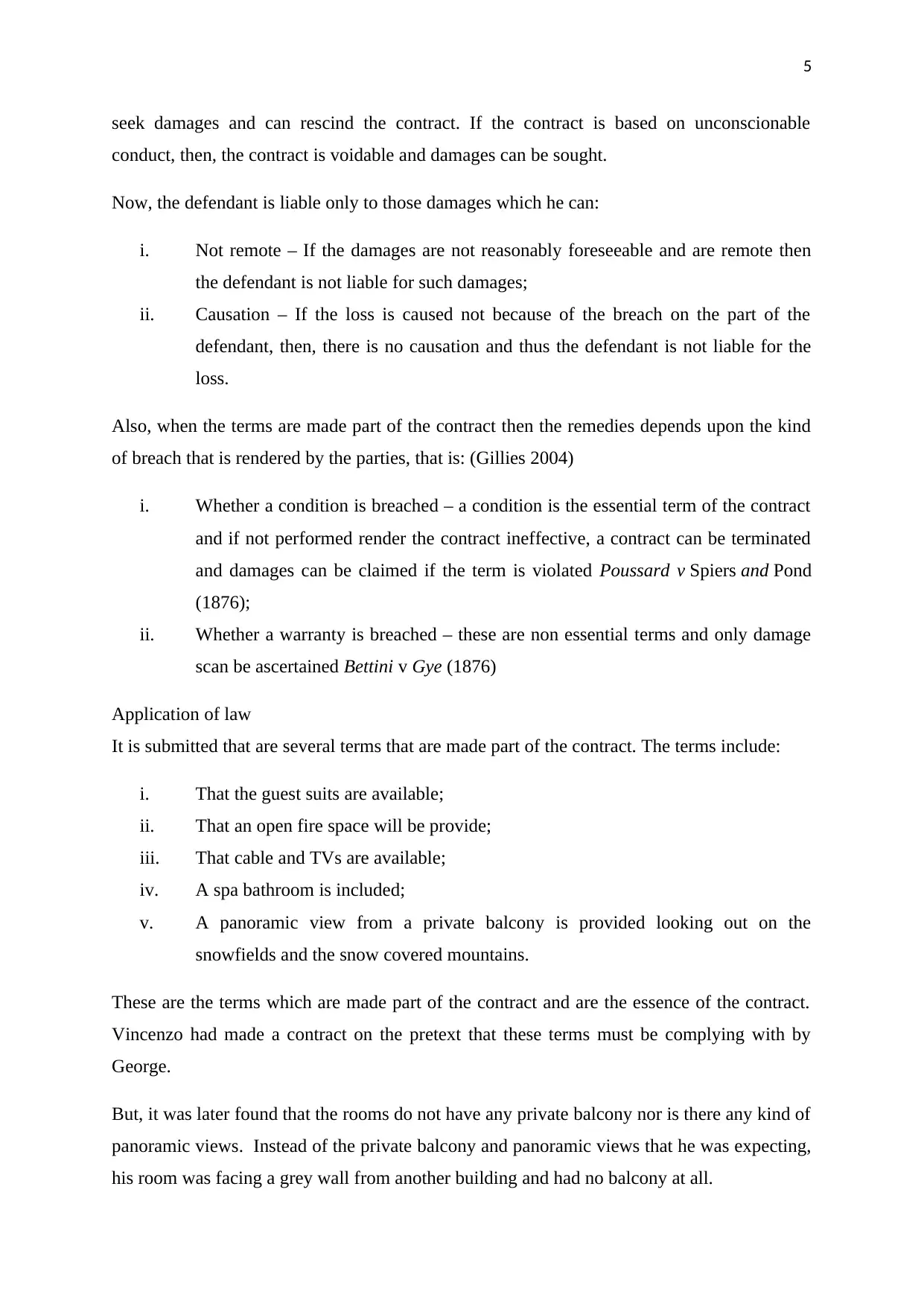
5
seek damages and can rescind the contract. If the contract is based on unconscionable
conduct, then, the contract is voidable and damages can be sought.
Now, the defendant is liable only to those damages which he can:
i. Not remote – If the damages are not reasonably foreseeable and are remote then
the defendant is not liable for such damages;
ii. Causation – If the loss is caused not because of the breach on the part of the
defendant, then, there is no causation and thus the defendant is not liable for the
loss.
Also, when the terms are made part of the contract then the remedies depends upon the kind
of breach that is rendered by the parties, that is: (Gillies 2004)
i. Whether a condition is breached – a condition is the essential term of the contract
and if not performed render the contract ineffective, a contract can be terminated
and damages can be claimed if the term is violated Poussard v Spiers and Pond
(1876);
ii. Whether a warranty is breached – these are non essential terms and only damage
scan be ascertained Bettini v Gye (1876)
Application of law
It is submitted that are several terms that are made part of the contract. The terms include:
i. That the guest suits are available;
ii. That an open fire space will be provide;
iii. That cable and TVs are available;
iv. A spa bathroom is included;
v. A panoramic view from a private balcony is provided looking out on the
snowfields and the snow covered mountains.
These are the terms which are made part of the contract and are the essence of the contract.
Vincenzo had made a contract on the pretext that these terms must be complying with by
George.
But, it was later found that the rooms do not have any private balcony nor is there any kind of
panoramic views. Instead of the private balcony and panoramic views that he was expecting,
his room was facing a grey wall from another building and had no balcony at all.
seek damages and can rescind the contract. If the contract is based on unconscionable
conduct, then, the contract is voidable and damages can be sought.
Now, the defendant is liable only to those damages which he can:
i. Not remote – If the damages are not reasonably foreseeable and are remote then
the defendant is not liable for such damages;
ii. Causation – If the loss is caused not because of the breach on the part of the
defendant, then, there is no causation and thus the defendant is not liable for the
loss.
Also, when the terms are made part of the contract then the remedies depends upon the kind
of breach that is rendered by the parties, that is: (Gillies 2004)
i. Whether a condition is breached – a condition is the essential term of the contract
and if not performed render the contract ineffective, a contract can be terminated
and damages can be claimed if the term is violated Poussard v Spiers and Pond
(1876);
ii. Whether a warranty is breached – these are non essential terms and only damage
scan be ascertained Bettini v Gye (1876)
Application of law
It is submitted that are several terms that are made part of the contract. The terms include:
i. That the guest suits are available;
ii. That an open fire space will be provide;
iii. That cable and TVs are available;
iv. A spa bathroom is included;
v. A panoramic view from a private balcony is provided looking out on the
snowfields and the snow covered mountains.
These are the terms which are made part of the contract and are the essence of the contract.
Vincenzo had made a contract on the pretext that these terms must be complying with by
George.
But, it was later found that the rooms do not have any private balcony nor is there any kind of
panoramic views. Instead of the private balcony and panoramic views that he was expecting,
his room was facing a grey wall from another building and had no balcony at all.
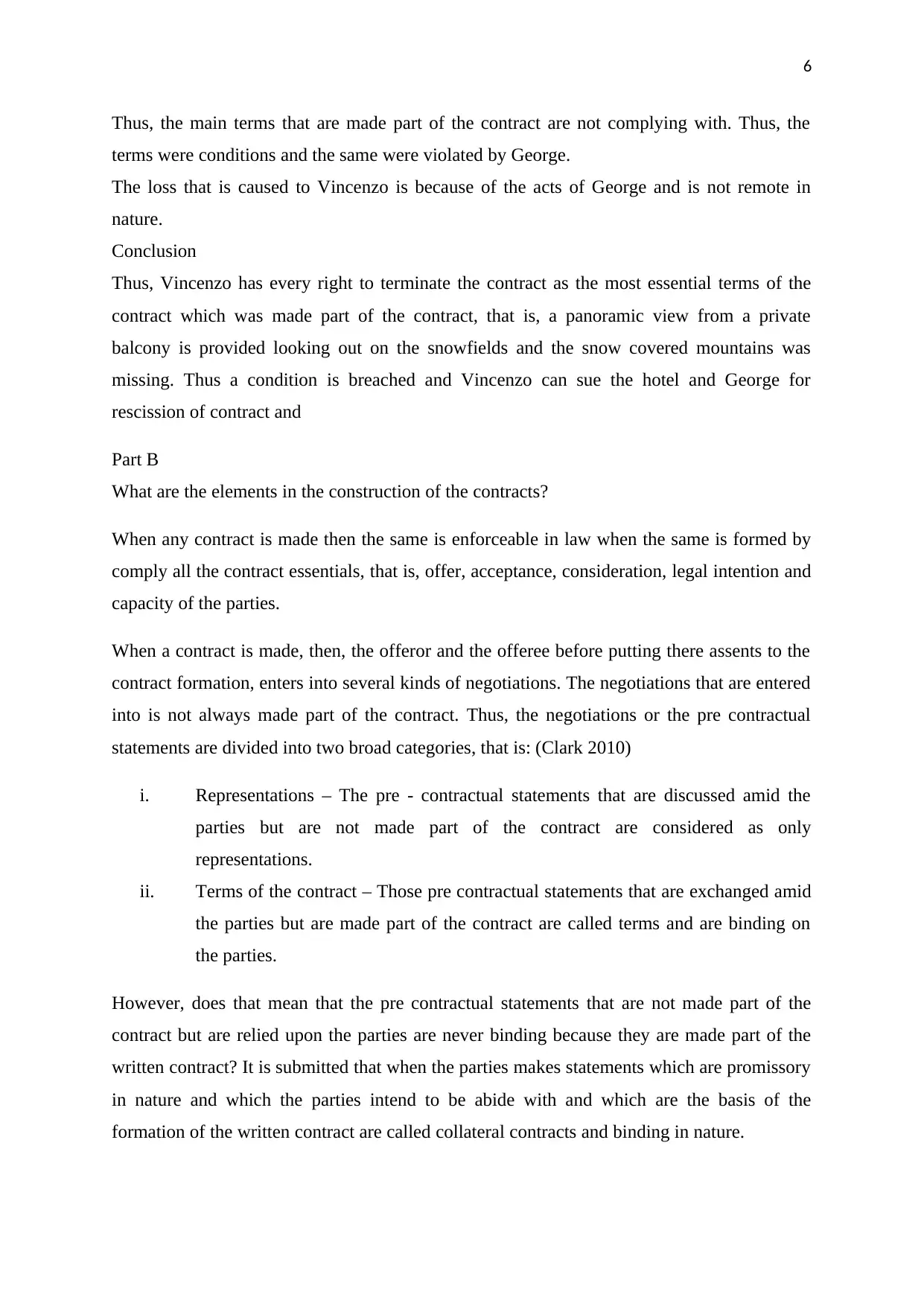
6
Thus, the main terms that are made part of the contract are not complying with. Thus, the
terms were conditions and the same were violated by George.
The loss that is caused to Vincenzo is because of the acts of George and is not remote in
nature.
Conclusion
Thus, Vincenzo has every right to terminate the contract as the most essential terms of the
contract which was made part of the contract, that is, a panoramic view from a private
balcony is provided looking out on the snowfields and the snow covered mountains was
missing. Thus a condition is breached and Vincenzo can sue the hotel and George for
rescission of contract and
Part B
What are the elements in the construction of the contracts?
When any contract is made then the same is enforceable in law when the same is formed by
comply all the contract essentials, that is, offer, acceptance, consideration, legal intention and
capacity of the parties.
When a contract is made, then, the offeror and the offeree before putting there assents to the
contract formation, enters into several kinds of negotiations. The negotiations that are entered
into is not always made part of the contract. Thus, the negotiations or the pre contractual
statements are divided into two broad categories, that is: (Clark 2010)
i. Representations – The pre - contractual statements that are discussed amid the
parties but are not made part of the contract are considered as only
representations.
ii. Terms of the contract – Those pre contractual statements that are exchanged amid
the parties but are made part of the contract are called terms and are binding on
the parties.
However, does that mean that the pre contractual statements that are not made part of the
contract but are relied upon the parties are never binding because they are made part of the
written contract? It is submitted that when the parties makes statements which are promissory
in nature and which the parties intend to be abide with and which are the basis of the
formation of the written contract are called collateral contracts and binding in nature.
Thus, the main terms that are made part of the contract are not complying with. Thus, the
terms were conditions and the same were violated by George.
The loss that is caused to Vincenzo is because of the acts of George and is not remote in
nature.
Conclusion
Thus, Vincenzo has every right to terminate the contract as the most essential terms of the
contract which was made part of the contract, that is, a panoramic view from a private
balcony is provided looking out on the snowfields and the snow covered mountains was
missing. Thus a condition is breached and Vincenzo can sue the hotel and George for
rescission of contract and
Part B
What are the elements in the construction of the contracts?
When any contract is made then the same is enforceable in law when the same is formed by
comply all the contract essentials, that is, offer, acceptance, consideration, legal intention and
capacity of the parties.
When a contract is made, then, the offeror and the offeree before putting there assents to the
contract formation, enters into several kinds of negotiations. The negotiations that are entered
into is not always made part of the contract. Thus, the negotiations or the pre contractual
statements are divided into two broad categories, that is: (Clark 2010)
i. Representations – The pre - contractual statements that are discussed amid the
parties but are not made part of the contract are considered as only
representations.
ii. Terms of the contract – Those pre contractual statements that are exchanged amid
the parties but are made part of the contract are called terms and are binding on
the parties.
However, does that mean that the pre contractual statements that are not made part of the
contract but are relied upon the parties are never binding because they are made part of the
written contract? It is submitted that when the parties makes statements which are promissory
in nature and which the parties intend to be abide with and which are the basis of the
formation of the written contract are called collateral contracts and binding in nature.
⊘ This is a preview!⊘
Do you want full access?
Subscribe today to unlock all pages.

Trusted by 1+ million students worldwide
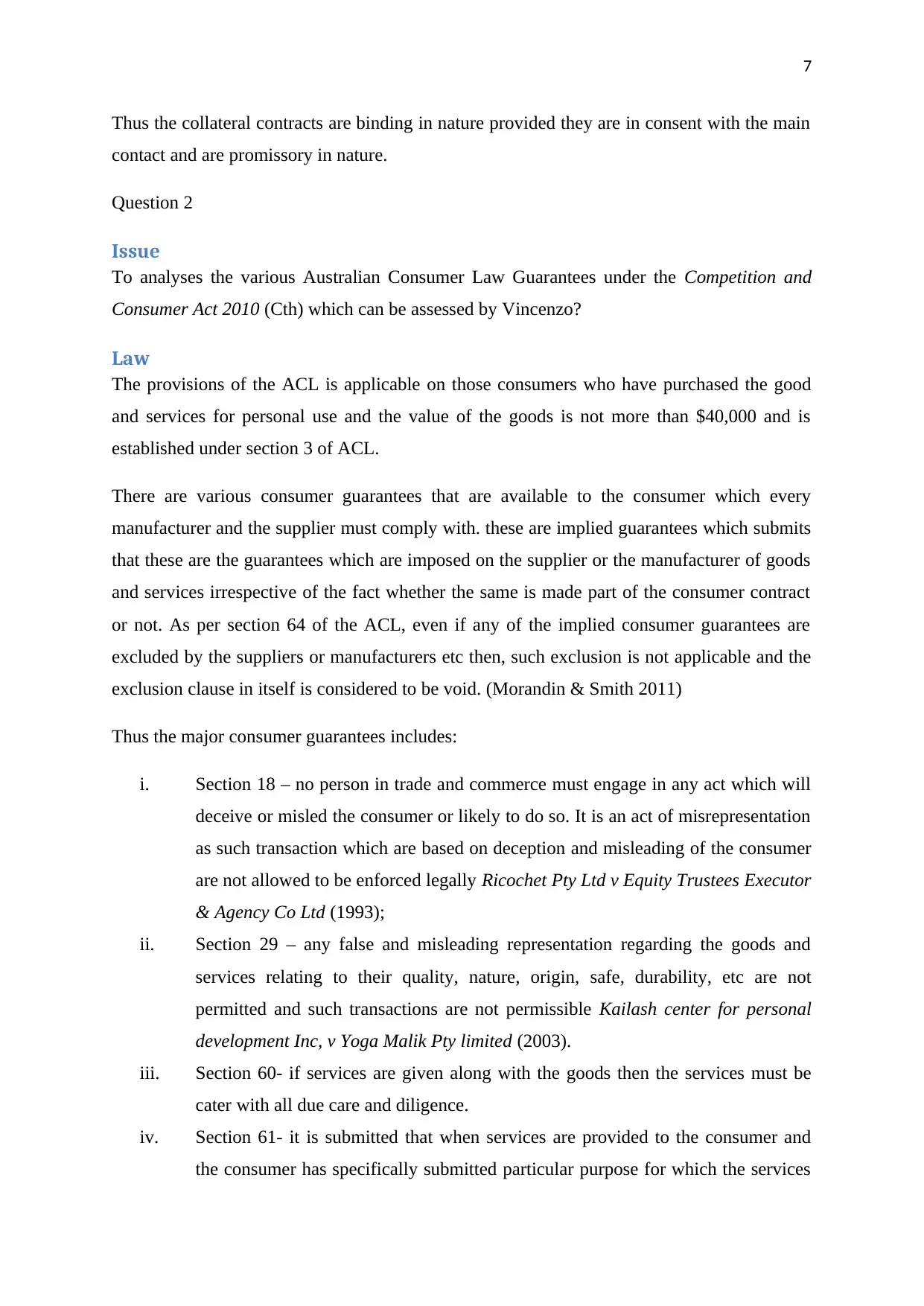
7
Thus the collateral contracts are binding in nature provided they are in consent with the main
contact and are promissory in nature.
Question 2
Issue
To analyses the various Australian Consumer Law Guarantees under the Competition and
Consumer Act 2010 (Cth) which can be assessed by Vincenzo?
Law
The provisions of the ACL is applicable on those consumers who have purchased the good
and services for personal use and the value of the goods is not more than $40,000 and is
established under section 3 of ACL.
There are various consumer guarantees that are available to the consumer which every
manufacturer and the supplier must comply with. these are implied guarantees which submits
that these are the guarantees which are imposed on the supplier or the manufacturer of goods
and services irrespective of the fact whether the same is made part of the consumer contract
or not. As per section 64 of the ACL, even if any of the implied consumer guarantees are
excluded by the suppliers or manufacturers etc then, such exclusion is not applicable and the
exclusion clause in itself is considered to be void. (Morandin & Smith 2011)
Thus the major consumer guarantees includes:
i. Section 18 – no person in trade and commerce must engage in any act which will
deceive or misled the consumer or likely to do so. It is an act of misrepresentation
as such transaction which are based on deception and misleading of the consumer
are not allowed to be enforced legally Ricochet Pty Ltd v Equity Trustees Executor
& Agency Co Ltd (1993);
ii. Section 29 – any false and misleading representation regarding the goods and
services relating to their quality, nature, origin, safe, durability, etc are not
permitted and such transactions are not permissible Kailash center for personal
development Inc, v Yoga Malik Pty limited (2003).
iii. Section 60- if services are given along with the goods then the services must be
cater with all due care and diligence.
iv. Section 61- it is submitted that when services are provided to the consumer and
the consumer has specifically submitted particular purpose for which the services
Thus the collateral contracts are binding in nature provided they are in consent with the main
contact and are promissory in nature.
Question 2
Issue
To analyses the various Australian Consumer Law Guarantees under the Competition and
Consumer Act 2010 (Cth) which can be assessed by Vincenzo?
Law
The provisions of the ACL is applicable on those consumers who have purchased the good
and services for personal use and the value of the goods is not more than $40,000 and is
established under section 3 of ACL.
There are various consumer guarantees that are available to the consumer which every
manufacturer and the supplier must comply with. these are implied guarantees which submits
that these are the guarantees which are imposed on the supplier or the manufacturer of goods
and services irrespective of the fact whether the same is made part of the consumer contract
or not. As per section 64 of the ACL, even if any of the implied consumer guarantees are
excluded by the suppliers or manufacturers etc then, such exclusion is not applicable and the
exclusion clause in itself is considered to be void. (Morandin & Smith 2011)
Thus the major consumer guarantees includes:
i. Section 18 – no person in trade and commerce must engage in any act which will
deceive or misled the consumer or likely to do so. It is an act of misrepresentation
as such transaction which are based on deception and misleading of the consumer
are not allowed to be enforced legally Ricochet Pty Ltd v Equity Trustees Executor
& Agency Co Ltd (1993);
ii. Section 29 – any false and misleading representation regarding the goods and
services relating to their quality, nature, origin, safe, durability, etc are not
permitted and such transactions are not permissible Kailash center for personal
development Inc, v Yoga Malik Pty limited (2003).
iii. Section 60- if services are given along with the goods then the services must be
cater with all due care and diligence.
iv. Section 61- it is submitted that when services are provided to the consumer and
the consumer has specifically submitted particular purpose for which the services
Paraphrase This Document
Need a fresh take? Get an instant paraphrase of this document with our AI Paraphraser
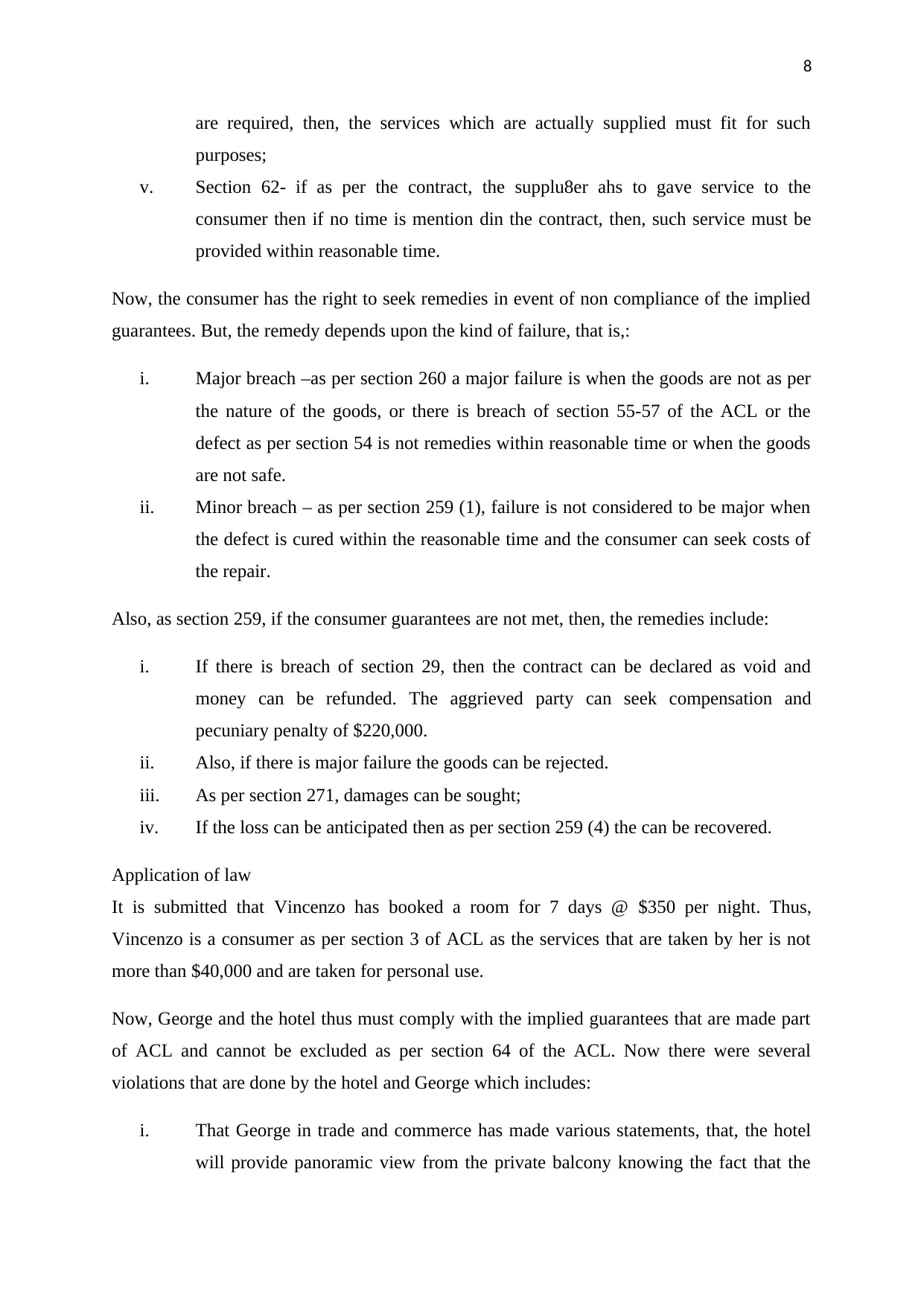
8
are required, then, the services which are actually supplied must fit for such
purposes;
v. Section 62- if as per the contract, the supplu8er ahs to gave service to the
consumer then if no time is mention din the contract, then, such service must be
provided within reasonable time.
Now, the consumer has the right to seek remedies in event of non compliance of the implied
guarantees. But, the remedy depends upon the kind of failure, that is,:
i. Major breach –as per section 260 a major failure is when the goods are not as per
the nature of the goods, or there is breach of section 55-57 of the ACL or the
defect as per section 54 is not remedies within reasonable time or when the goods
are not safe.
ii. Minor breach – as per section 259 (1), failure is not considered to be major when
the defect is cured within the reasonable time and the consumer can seek costs of
the repair.
Also, as section 259, if the consumer guarantees are not met, then, the remedies include:
i. If there is breach of section 29, then the contract can be declared as void and
money can be refunded. The aggrieved party can seek compensation and
pecuniary penalty of $220,000.
ii. Also, if there is major failure the goods can be rejected.
iii. As per section 271, damages can be sought;
iv. If the loss can be anticipated then as per section 259 (4) the can be recovered.
Application of law
It is submitted that Vincenzo has booked a room for 7 days @ $350 per night. Thus,
Vincenzo is a consumer as per section 3 of ACL as the services that are taken by her is not
more than $40,000 and are taken for personal use.
Now, George and the hotel thus must comply with the implied guarantees that are made part
of ACL and cannot be excluded as per section 64 of the ACL. Now there were several
violations that are done by the hotel and George which includes:
i. That George in trade and commerce has made various statements, that, the hotel
will provide panoramic view from the private balcony knowing the fact that the
are required, then, the services which are actually supplied must fit for such
purposes;
v. Section 62- if as per the contract, the supplu8er ahs to gave service to the
consumer then if no time is mention din the contract, then, such service must be
provided within reasonable time.
Now, the consumer has the right to seek remedies in event of non compliance of the implied
guarantees. But, the remedy depends upon the kind of failure, that is,:
i. Major breach –as per section 260 a major failure is when the goods are not as per
the nature of the goods, or there is breach of section 55-57 of the ACL or the
defect as per section 54 is not remedies within reasonable time or when the goods
are not safe.
ii. Minor breach – as per section 259 (1), failure is not considered to be major when
the defect is cured within the reasonable time and the consumer can seek costs of
the repair.
Also, as section 259, if the consumer guarantees are not met, then, the remedies include:
i. If there is breach of section 29, then the contract can be declared as void and
money can be refunded. The aggrieved party can seek compensation and
pecuniary penalty of $220,000.
ii. Also, if there is major failure the goods can be rejected.
iii. As per section 271, damages can be sought;
iv. If the loss can be anticipated then as per section 259 (4) the can be recovered.
Application of law
It is submitted that Vincenzo has booked a room for 7 days @ $350 per night. Thus,
Vincenzo is a consumer as per section 3 of ACL as the services that are taken by her is not
more than $40,000 and are taken for personal use.
Now, George and the hotel thus must comply with the implied guarantees that are made part
of ACL and cannot be excluded as per section 64 of the ACL. Now there were several
violations that are done by the hotel and George which includes:
i. That George in trade and commerce has made various statements, that, the hotel
will provide panoramic view from the private balcony knowing the fact that the
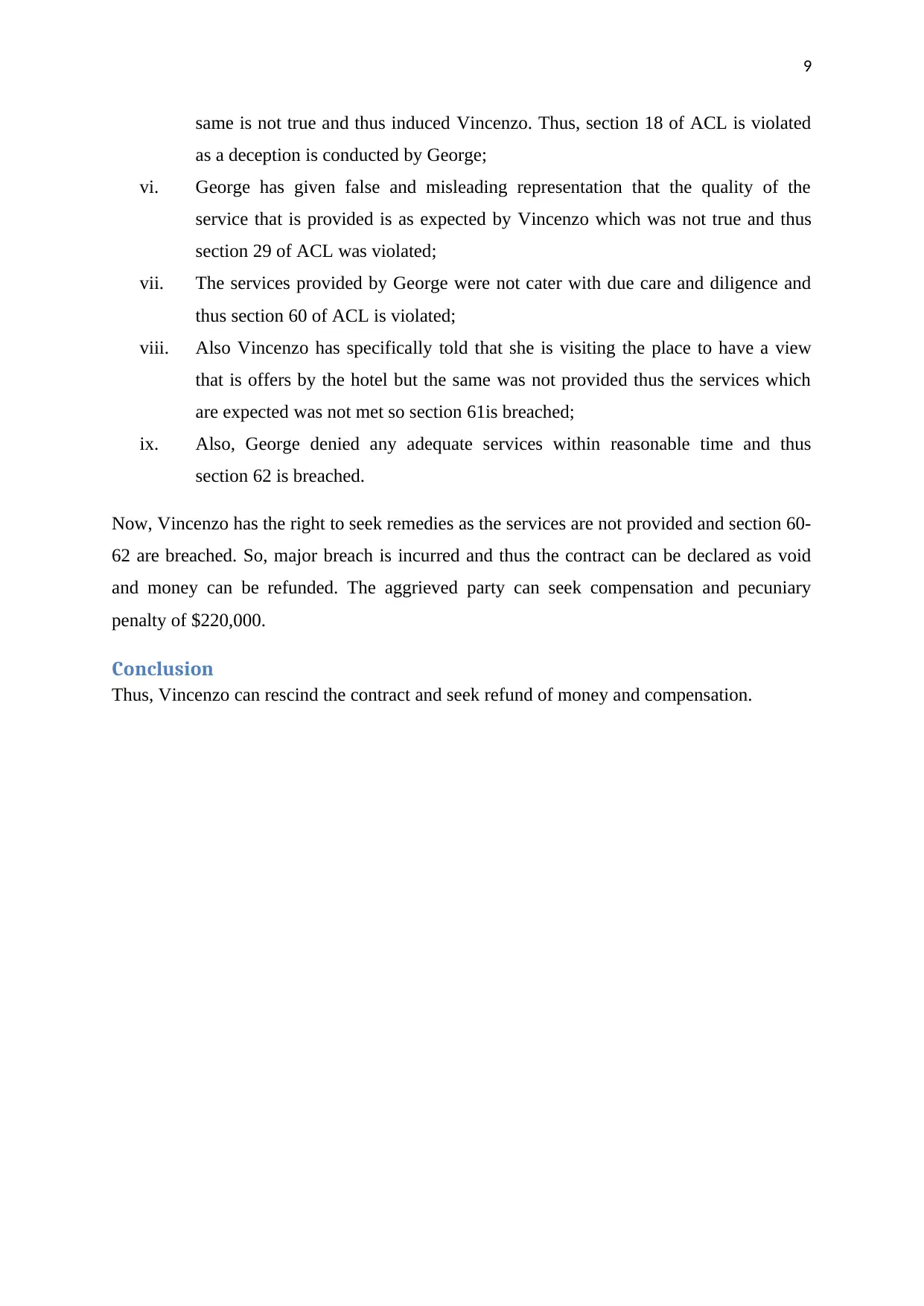
9
same is not true and thus induced Vincenzo. Thus, section 18 of ACL is violated
as a deception is conducted by George;
vi. George has given false and misleading representation that the quality of the
service that is provided is as expected by Vincenzo which was not true and thus
section 29 of ACL was violated;
vii. The services provided by George were not cater with due care and diligence and
thus section 60 of ACL is violated;
viii. Also Vincenzo has specifically told that she is visiting the place to have a view
that is offers by the hotel but the same was not provided thus the services which
are expected was not met so section 61is breached;
ix. Also, George denied any adequate services within reasonable time and thus
section 62 is breached.
Now, Vincenzo has the right to seek remedies as the services are not provided and section 60-
62 are breached. So, major breach is incurred and thus the contract can be declared as void
and money can be refunded. The aggrieved party can seek compensation and pecuniary
penalty of $220,000.
Conclusion
Thus, Vincenzo can rescind the contract and seek refund of money and compensation.
same is not true and thus induced Vincenzo. Thus, section 18 of ACL is violated
as a deception is conducted by George;
vi. George has given false and misleading representation that the quality of the
service that is provided is as expected by Vincenzo which was not true and thus
section 29 of ACL was violated;
vii. The services provided by George were not cater with due care and diligence and
thus section 60 of ACL is violated;
viii. Also Vincenzo has specifically told that she is visiting the place to have a view
that is offers by the hotel but the same was not provided thus the services which
are expected was not met so section 61is breached;
ix. Also, George denied any adequate services within reasonable time and thus
section 62 is breached.
Now, Vincenzo has the right to seek remedies as the services are not provided and section 60-
62 are breached. So, major breach is incurred and thus the contract can be declared as void
and money can be refunded. The aggrieved party can seek compensation and pecuniary
penalty of $220,000.
Conclusion
Thus, Vincenzo can rescind the contract and seek refund of money and compensation.
⊘ This is a preview!⊘
Do you want full access?
Subscribe today to unlock all pages.

Trusted by 1+ million students worldwide
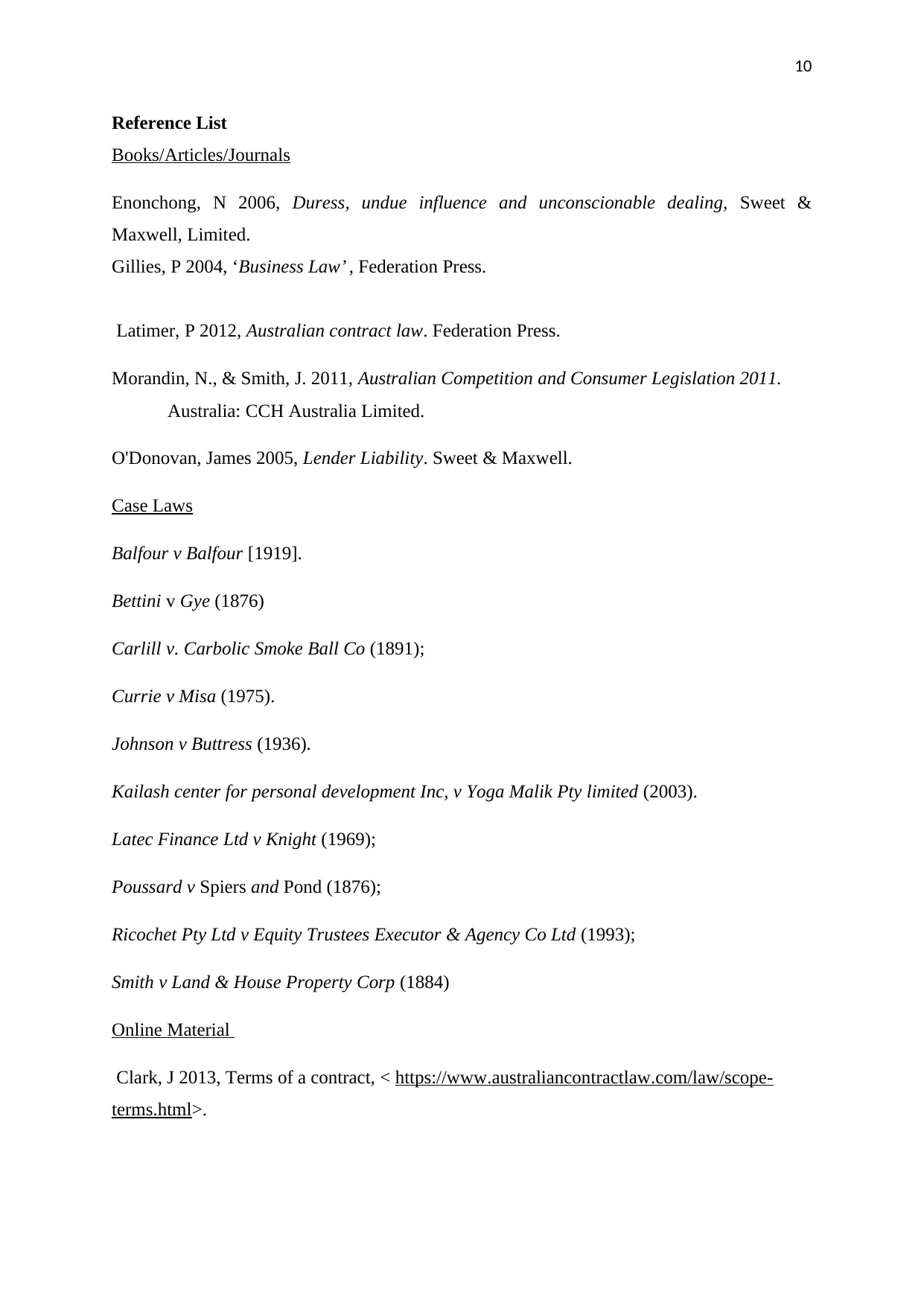
10
Reference List
Books/Articles/Journals
Enonchong, N 2006, Duress, undue influence and unconscionable dealing, Sweet &
Maxwell, Limited.
Gillies, P 2004, ‘Business Law’ , Federation Press.
Latimer, P 2012, Australian contract law. Federation Press.
Morandin, N., & Smith, J. 2011, Australian Competition and Consumer Legislation 2011.
Australia: CCH Australia Limited.
O'Donovan, James 2005, Lender Liability. Sweet & Maxwell.
Case Laws
Balfour v Balfour [1919].
Bettini v Gye (1876)
Carlill v. Carbolic Smoke Ball Co (1891);
Currie v Misa (1975).
Johnson v Buttress (1936).
Kailash center for personal development Inc, v Yoga Malik Pty limited (2003).
Latec Finance Ltd v Knight (1969);
Poussard v Spiers and Pond (1876);
Ricochet Pty Ltd v Equity Trustees Executor & Agency Co Ltd (1993);
Smith v Land & House Property Corp (1884)
Online Material
Clark, J 2013, Terms of a contract, < https://www.australiancontractlaw.com/law/scope-
terms.html>.
Reference List
Books/Articles/Journals
Enonchong, N 2006, Duress, undue influence and unconscionable dealing, Sweet &
Maxwell, Limited.
Gillies, P 2004, ‘Business Law’ , Federation Press.
Latimer, P 2012, Australian contract law. Federation Press.
Morandin, N., & Smith, J. 2011, Australian Competition and Consumer Legislation 2011.
Australia: CCH Australia Limited.
O'Donovan, James 2005, Lender Liability. Sweet & Maxwell.
Case Laws
Balfour v Balfour [1919].
Bettini v Gye (1876)
Carlill v. Carbolic Smoke Ball Co (1891);
Currie v Misa (1975).
Johnson v Buttress (1936).
Kailash center for personal development Inc, v Yoga Malik Pty limited (2003).
Latec Finance Ltd v Knight (1969);
Poussard v Spiers and Pond (1876);
Ricochet Pty Ltd v Equity Trustees Executor & Agency Co Ltd (1993);
Smith v Land & House Property Corp (1884)
Online Material
Clark, J 2013, Terms of a contract, < https://www.australiancontractlaw.com/law/scope-
terms.html>.
1 out of 10
Related Documents
Your All-in-One AI-Powered Toolkit for Academic Success.
+13062052269
info@desklib.com
Available 24*7 on WhatsApp / Email
![[object Object]](/_next/static/media/star-bottom.7253800d.svg)
Unlock your academic potential
Copyright © 2020–2025 A2Z Services. All Rights Reserved. Developed and managed by ZUCOL.





